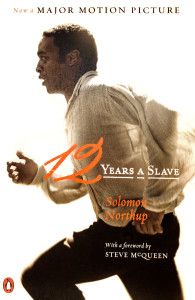 The foundation of humanity is threatened in this powerful slave drama when most people’s “sentimentality extends the length of a coin.”
The foundation of humanity is threatened in this powerful slave drama when most people’s “sentimentality extends the length of a coin.”
“12 Years a Slave,” the extraordinary true story adapted from Solomon Northup’s 1853 memoir of the same title, is a rollercoaster that will have you leaping from one emotion to the next. Steve McQueen (“Shame”) delivers a beautiful film that delves extensively into the shameful truth of our nation’s history—he brilliantly illustrates the nuances of cruelty in his honestly brutal depiction of slavery that will leave you speechless. With its stunning visuals and dynamic cast of actors, who are nothing short of spectacular, this film sets the bar for future representations of slavery.
Accomplished violinist Solomon Northup (Chiwetal Ejiofor) is living freely in Saratoga, New York in 1841 with his wife and two children, when two white men invite him along to Washington for a series of performances that promise to bring Northup a profit. However, he soon finds himself the victim of a con and awakens in a drab, dark room bound by chains. Despite protestations of his freedom, Northup is brutally beaten and sold into slavery.
Transported south to New Orleans, he is forced to accept the new identity of a “runaway nigga from Georgia” that goes by the name Platt. Once arrived, he and his fellow slaves are stripped, washed and displayed, like a bunch of animals that are to be auctioned off to the highest bidder. It’s not long before he is purchased by the somewhat sympathetic Mr. Ford (Benedict Cumberbatch).
Unfortunately, after a confrontation with a vindictive overseer (Paul Dano), Northup becomes the property of the vicious Edwin Epps (Michael Fassbender). It is under Epps that he endures the worst years of his life—subject to physical and mental abuse and witness to various acts of cruelty against his fellow slaves. Northup’s determination, to not only survive but to live, slowly deteriorates.
Despite the film’s overwhelmingly horrifying nature, McQueen is able to intertwine moments of beauty with such subtlety. Scenes as simple as Northup carving his family’s names into his violin or just a serene shot of landscape is enough to take you out of that dark place and leave you with enough hope to carry you through the entire film. Luckily, he maintains the perfect balance between necessary and gratuitous violence. The brutality of the slave owners is very much present throughout the entire movie, but McQueen knows when to pull his punches, switching from the subtlety of slaves screaming in agony to the very graphic and disturbing images of torn flesh and blood.
Most fascinating is McQueen’s interesting critique on slavery. His focus on the complexity of the human race showcases the varying degrees of cruelty—whether it’s the passively sympathetic Mr. Ford (Cumberbatch), who overlooks all signs of Northup’s past freedom, or the volatile Mistress Epps (Sarah Paulson), who viciously punishes the helpless slave her husband abuses out of jealousy–everyone is guilty of malevolence.
It is really the strong cast of actors, though, that makes the film remarkable. Fassbender brings new dimension to his villainous character, portraying the sadistic Mr. Epps with such complexity that he makes you feel sorry for this miserable human being. But it is Ejiofor, mostly known for his secondary character roles, who really shines as Solomon Northup. He gives the performance of his career, effortlessly conveying all the pain and suffering of slavery with a single expression while naturally depicting Solomon’s transformation from a strong-willed free man to a dejected beaten-down slave.
This brutally honest representation of slavery will leave you in awe of the human capacity for cruelty—watching it is almost unbelievable until you remember that it actually happened. Don’t be surprised if it takes home all the Oscars this year, including Best Picture, Director, Actor in a Leading Role for Ejiofor (and Supporting Role for Fassbender).
“12 Years a Slave” is an absolute masterpiece that must be seen, earning four of four stars for its no-holds-barred approach to slavery. If you haven’t gotten the chance to see it yet, go. Go now.








